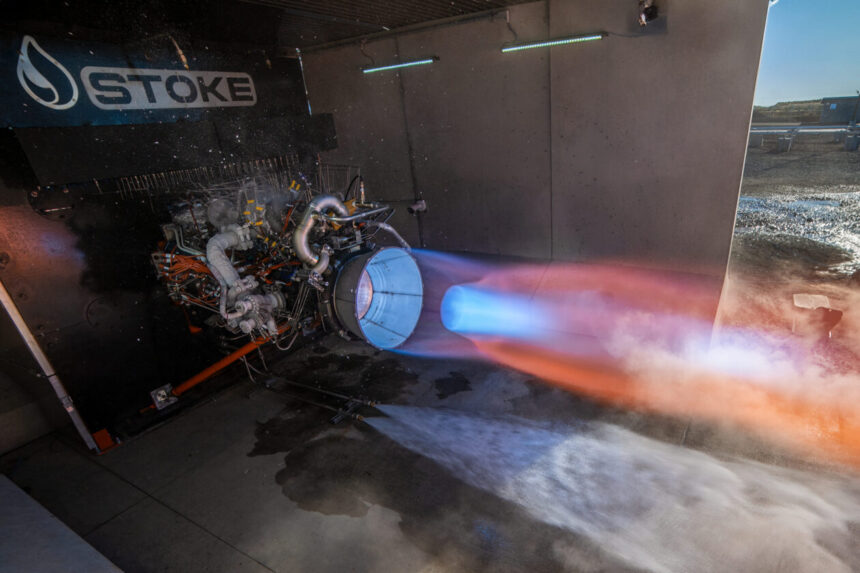Stoke Space, one of the Seattle area’s up-and-coming space startups, is said to be raising hundreds of millions of dollars in a funding round that it hasn’t yet publicly acknowledged. A report about the round, based on two unidentified sources, was published today by The Information.
The Information quoted its sources as saying that the funding round could total as much as $500 million, and would value Stoke at nearly $2 billion. That figure would be roughly twice as much as the $944 million valuation that was cited by Pitchbook as of January. The round’s lead investor is said to be Thomas Tull’s United States Innovative Technology Fund.
We’ve reached out to Stoke Space as well as USIT, and will update this report with any further information we can pass along.
Kent, Wash.-based Stoke Space was founded in 2019 by two veterans of Jeff Bezos’ Blue Origin space venture, CEO Andy Lapsa and chief technology officer Tom Feldman. The company aims to create a fully reusable, two-stage rocket that’s been dubbed Nova.
Stoke conducted short-hop tests of a prototype upper stage two years ago, and its first-stage booster is in the latter stages of development. It’s also building a launch facility in Florida, at the Cape Canaveral site where John Glenn became the first American in orbit back in 1962.
If all goes according to plan, Nova’s first test launch would come next year. One of The Information’s sources said the new investment round should fund multiple launch attempts.
Since its founding, Stoke has raised nearly half a billion dollars in funding from investors including Bill Gates’ Breakthrough Energy Ventures, Industrious Ventures and Y Combinator. That includes $260 million in a Series C investment round that came to light in January.
In addition to the Florida launch facility, Stoke has a 168,000-square-foot headquarters facility in Kent — not far from Blue Origin’s HQ — and a 75-acre test facility in Moses Lake, Wash. Even though Stoke Space hasn’t yet launched a rocket to orbit, it was added to the U.S. Space Force’s list of providers for national security launches this March.
To some extent, Stoke is building on the success of Elon Musk’s SpaceX — which pioneered reusable first-stage boosters for its Falcon 9 and Falcon Heavy rockets, and is working on full two-stage reusability for its Starship super-rocket. Stoke has developed a liquid-cooled heat shield for its second stage, taking advantage of an approach that Musk is now considering for Starship’s second stage.
Last year, Lapsa told GeekWire there’s plenty of room in the launch industry for companies that can offer fully reusable rockets with medium-lift capability — that is, the ability to send from two to 20 tons of payload to low Earth orbit, as opposed to Starship’s 100-ton capacity.
“The question that we get more frequently is, ‘What do you do when Starship comes online?’ And I’m personally super excited for that world,” Lapsa said. “I think that helps us lay heavy infrastructure in space. I think it creates more opportunity for the rest of the industry, including us. … Starship will put pressure on the industry to follow suit with full reusability, because it just fundamentally changes the cost.”
Previously: Stoke Space takes a novel route to rocket reusability
Read the full article here










